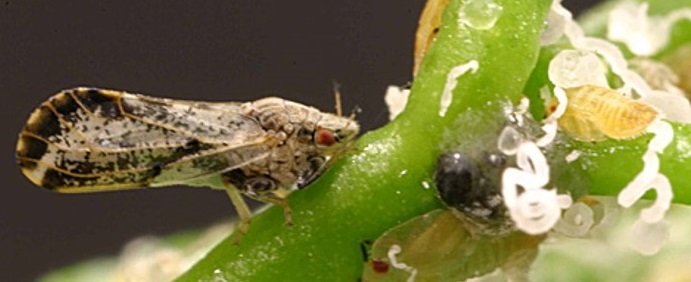Bt toxins for Management of Asian Citrus Psyllid
The Asian citrus psyllid (ACP), Diaphorina citri, is one of the most serious pests in U.S. and global citriculture. ACP transmits a pathogenic bacterium that causes citrus greening or huanglongbing (HLB) disease, which ultimately results in tree death. Severe economic losses are attributed to HLB in world citriculture. Controlling ACP is the first line of defense against the spread of HLB into new areas in Texas and California, and into new plantings in Florida. As an advancement over traditional insecticide strategies, Bonning leads a collaborative and trans-disciplinary project focused on a novel, sustainable approaches for management of ACP that are compatible with biocontrol programs. This group is working to develop pesticidal proteins derived from the soil bacterium Bacillus thuringiensis (Bt) for use against ACP, and to develop appropriate deployment methods.
Collaborators for this work include:
- Michael Blackburn
- William Dawson
- Lukasz Stelinski
- Vladimir Orbovic
- Nabil Killiny
- Manjul Dutt
- Monique Rivera
Related publications
Tavares, C.S., Stelinski, L.L., Bonning, B.C. 2024. The sandwich feeding assay for use with first instar nymphs of the Asian citrus psyllid, Diaphorina citri confirms the highest susceptibility of this life stage to bacterial pesticidal proteins. Journal of Invertebrate Pathology 207: 108208 doi: 10.1016/j.jip.2024.108208
Tavares, C.S., Mishra, R., Kishk, A., Wang, X., Ghobrial, P.N., Killiny, N., Bonning, B.C. 2024. The beta pore-forming bacterial pesticidal protein Tpp78Aa1 is toxic to the Asian citrus psyllid vector of the citrus greening bacterium. J. Invertebr. Pathol. 204:108122. doi: 10.1016/j.jip.2024.108122
Tavares, C.S., Mishra, R. Bonning, B.C. 2023. Use of gut binding peptides as artificial anchors for bacterial pesticidal proteins. In: Advances in Insect Physiology vol. 65: 235-259 “Bacterial toxins and RNAi in the control of insects”, chapter 5 Academic Press. J.L. Jurat-Fuentes, Ed. doi: 10.1016/bs.aiip.2023.09.001
Mishra, R., Narayana, R., Ibanez-Carrasco, F., Achor, D., Shilts, T., El-Mohtar, C., Orbović, V., Stelinski, L., Bonning, B.C. 2023. Bacterial pesticidal protein Mpp51Aa1 delivered via transgenic citrus severely impacts the fecundity of Asian citrus psyllid, Diaphorina citri. Applied and Environmental Microbiology 89 (8): e00723-23. doi: 10.1128/aem.00723-23
Orbović, V., Ravanfar, S.A., Achor, D., Shilts, T., Ibanez-Carrasco, F., Banerjee, R., El-Mohtar, C., Stelinski, L., Bonning, B.C. 2023. Cry1Ba1-mediated toxicity of transgenic Bergera koenigii and Citrus sinensis to the Asian citrus psyllid Diaphorina citri. Frontiers in Insect Science vol 3: 1125987. doi: 10.3389/finsc.2023.11259873
Kishk, A., Tavares, C., Mishra, R. Bonning, B.C., Killiny, N. 2023. Influence of ‘Candidatus Liberibacter asiaticus’ infection on the susceptibility of Asian citrus psyllid, Diaphorina citri to Bacillus thuringiensis bioinsecticidal proteins, Mpp51Aa1 and Cry1Ba1. J. Invertebr. Pathol. 200:107972. doi: 10.1016/j.jip.2023.1079724
Blackburn, M.B., Sparks, M.E., Mishra, R., Bonning, B.C. 2023. Genomic sequencing of fourteen Bacillus thuringiensis isolates: insights into geographic variation and phylogenetic implications. BMC Research Notes 16(1):134. doi: 10.1186/s13104-023-06411-15
Tavares, C.S., Bonning, B.C. 2022. Mpp51Aa1 toxicity to Diaphorina citri nymphs demonstrated using a new, long-term bioassay method. Journal of Invertebrate Pathology, 1 95:107845. doi: 10.1016/j.jip.2022.1078456
Ravanfar, S.A., Achor, D.S., Killiny, N., Shilts, T., Chen, Y., El-Mohtar, C., Stelinski, L.L., Bonning, B.C., Orbović, V. 2022. Genetic modification of Bergera koenigii for expression of the bacterial pesticidal protein Cry1Ba1. Frontiers in Plant Science 13:899624. doi: 10.3389/fpls.2022.899624
Toxicity of Bacillus thuringiensis-Derived Pesticidal Proteins Cry1Ab and Cry1Ba against Asian Citrus Psyllid, Diaphorina citri (Hemiptera). Fernandez-Luna MT, Kumar P, Hall DG, Mitchell AD, Blackburn MB, Bonning BC. Toxins (Basel). 2019 Mar 22;11(3). pii: E173. doi: 10.3390/toxins11030173.

